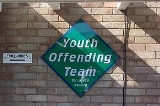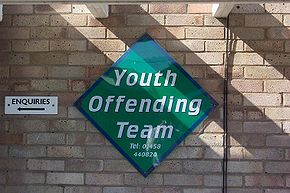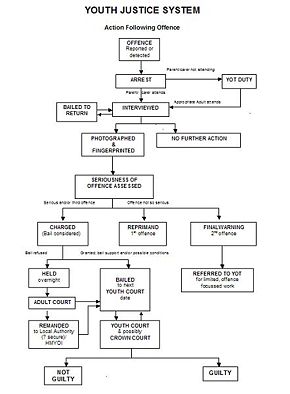
Youth Offending Team
Encyclopedia

England
England is a country that is part of the United Kingdom. It shares land borders with Scotland to the north and Wales to the west; the Irish Sea is to the north west, the Celtic Sea to the south west, with the North Sea to the east and the English Channel to the south separating it from continental...
and Wales
Wales
Wales is a country that is part of the United Kingdom and the island of Great Britain, bordered by England to its east and the Atlantic Ocean and Irish Sea to its west. It has a population of three million, and a total area of 20,779 km²...
a Youth Offending Team (YOT) is a multi-agency team that is coordinated by a local authority, which is overseen by the Youth Justice Board
Youth Justice Board
The Youth Justice Board for England and Wales is an executive non-departmental public body, funded by and reporting to the Ministry of Justice and Department for Education and Skills...
It deals with young offender
Young offender
A young offender is a young person who has been convicted or cautioned for a criminal offence. Criminal justice systems often deal with young offenders differently from adult offenders, but different countries apply the term 'young offender' to different age groups depending on the age of criminal...
s, sets up community service
Community service
Community service is donated service or activity that is performed by someone or a group of people for the benefit of the public or its institutions....
s and reparation plans, and attempts to prevent youth recidivism
Recidivism
Recidivism is the act of a person repeating an undesirable behavior after they have either experienced negative consequences of that behavior, or have been treated or trained to extinguish that behavior...
and incarceration. YOTs were set up following the 1998 Crime and Disorder Act with the intention of reducing the risk of young people offending and re-offending, and to provide counsel and rehabilitation to those who do offend. Youth Offending Teams engage in a wide variety of work with young offenders (those under 18) in order to achieve their aims. YOT's supervise young people who have been ordered by the court to serve sentences in the community or in the secure estate. Sometimes, teams organise meetings between offenders and victims to encourage apologies and reparation.
They also arrange for Appropriate Adults to accompany under 17's after their arrest in order to advise and support the young person, and observe that they are treated fairly. When a youth is arrested and unaccompanied by an adult (relation or friend who is over 18), the station often calls the local YOT to request an appropriate adult to come to the relevant station.
Their Role in the Criminal Justice Process
Youth Offending Teams engage young offenders in a wide range of tasksCommunity service
Community service is donated service or activity that is performed by someone or a group of people for the benefit of the public or its institutions....
designed to put something positive back into the local community through unpaid activities, as well as preventing them from re-offending. YOT's ensure that offenders have a lower chance of re-offending by performing checkups during the rehabilitation process, checking on their accommodation, friends, possibilities of coercion into offending or drug
Recreational drug use
Recreational drug use is the use of a drug, usually psychoactive, with the intention of creating or enhancing recreational experience. Such use is controversial, however, often being considered to be also drug abuse, and it is often illegal...
/alcohol use, and so on.
Youth Offending Teams can also provide important information relevant to a young persons case to police officer
Police officer
A police officer is a warranted employee of a police force...
s, social workers or the court
Court
A court is a form of tribunal, often a governmental institution, with the authority to adjudicate legal disputes between parties and carry out the administration of justice in civil, criminal, and administrative matters in accordance with the rule of law...
s.
All members of Youth Offending Teams have expertise in areas relevant to the care and rehabilitation of young offenders. These may include areas such as the Police Service
Policing in the United Kingdom
Law enforcement in the United Kingdom is organised separately in each of the legal systems of the United Kingdom: England & Wales, Northern Ireland and Scotland ....
, Probation Service, Social Services, the Health Service
National Health Service
The National Health Service is the shared name of three of the four publicly funded healthcare systems in the United Kingdom. They provide a comprehensive range of health services, the vast majority of which are free at the point of use to residents of the United Kingdom...
, Education
Education
Education in its broadest, general sense is the means through which the aims and habits of a group of people lives on from one generation to the next. Generally, it occurs through any experience that has a formative effect on the way one thinks, feels, or acts...
, and Psychology
Psychology
Psychology is the study of the mind and behavior. Its immediate goal is to understand individuals and groups by both establishing general principles and researching specific cases. For many, the ultimate goal of psychology is to benefit society...
.
Education
Education workers are some of the most important in Youth Offending Teams since most young offenders should be engaged with statutory full time education. These workers liaise with schools and the education department where a young person is experiencing difficulties at school, particularly if there is a risk of exclusionExpulsion (academia)
Expulsion or exclusion refers to the permanent removal of a student from a school system or university for violating that institution's rules. Laws and procedures regarding expulsion vary between countries and states.-State sector:...
or bullying.
Sometimes it can be useful for the education worker to offer a young person support with some particular aspect of his/her school work: study skills
Study Skills
Study skills or study strategies are approaches applied to learning. They are generally critical to success in school, are considered essential for acquiring good grades, and are useful for learning throughout one's life....
, coursework, or facilitating communication between the young person, the school, and the home. Education workers also arrange for the continuing education of young people who go into custody, particularly if they are still of school age. If possible, the workers ensure that the work done in school and custody are of equal content and quality.
School leavers also work with education workers if they need to acquire skills to apply for jobs, for example CV writing, form filling, interview advice and so on. Some educational workers also encourage young people to express their feelings in writing as a way to vent aggravation or to comprehend their difficult situation..
Psychology

The meetings are informal and typically last an hour but can vary in length depending on the preference of the young person and psychologist. While these meetings are primarily for conversation, the psychologist will sometimes employ drawing or other tests to explore problems. Occasionally the psychologist will include other family members if relevant. Sessions with the YOT psychologist normally occur every two to three weeks.
Reports made by the psychologist on the young person are included in that persons file, along with any other relevant information pertinent to the case.
Reprimand
For relatively minor offences, the police issue a reprimandReprimand
A reprimand is a severe, formal or official reproof. Reprimanding takes in different forms in different legal systems, such as in UK law.- UK :...
, not a criminal conviction, but the reprimand is made note of on police computer records and any further offending will result in a Final Warning. A young person who has received a Police reprimand is not required to undertake any work with the YOT, although this may sometimes be offered on a voluntary basis.
Final Warning
A final warning is a disposal used by the police without a young offender who admits their guilt having to appear in court. They are issued to offenders aged 10–17. A record is made of this on the Police National Computer system. A Final Warning on a person's record influences the decision of the courts and police if a further offence is committed.It is the objective of the Youth Offending Teams to prevent young people offenders from reoffending after a Final Warning. They visit and assess young offenders and undertake diversionary work before (or after) the formal Final Warning is issued.
Conditional discharge
Lasting from 3 months to 3 years, with the young person being discharged on the condition that they do not commit any further offences within the specified period. If they re-offend they may be re-sentenced for the offences for which the discharge was imposed as well as the additional matters.Referral Orders http://www.yjb.gov.uk/dep/
When an offender comes to Court for the first time and pleads guilty, the court issues a Referral Order. This order is designed to prevent further offending by that young person. The referral order refers the young offender to a Youth Offending Team and places the young person under their supervision for a period of 3–12 months. The Youth Offending Team will set up a Panel Meeting for Community volunteers to meet with the young person.Community Panel Members try to agree a Referral Order Contract with the young person and their parent/carer, to prevent their further offending. Where victims of crime have agreed to attend or be represented, the victim will themselves be given the opportunity to speak about their feelings and how they have been affected. This might occur by audio, video, letter or face to face; the process is monitored by YOT team members. The contract agreed by the young person will include work on reparation to the victim(s).

If the young person fails to attend specified Panel meetings, this may lead to a reappearance in court. The violation of the contract will also lead to further legal action. Appointments and meetings must be kept. At the end of the program, the referral order is finished and the young person is released from the program. When this happens, the young person's conviction will be immediately "spent", meaning that they sometimes do not have to disclose it to employers etc.
Reparation Order
Reparation orders can also be given by the court. A member of the Youth Offending Team, known as a Responsible Officer, is placed in charge of the reparation program, and will give support and advice for the offender.During several appointments, the young person is expected to perform tasks to account for their actions. Reparation orders can last a maximum of three months, aiming to prevent re-offending and rehabilitate. As with other court orders, inappropriate actions (arriving for an appointments under the influence, using abusive language, violence, or non-cooperation) will lead to a written warning. Further infractions will lead to "breach action", at a further Court hearing.
Curfew Orders
Can be enforced with a maximum of three months for under 16 year olds, six months for those older. Restriction of liberty is enforced at the courts discretion. These orders are to combat night time offending, requiring the young person to be in the confines of their home between 8:00pm and 7:00am (for example), these orders can stand alone or be added alongside a community penalty.Note that this Order has been replace with a Youth Rehabilitation Order for offences committed after 30 November 2009. See additional entry below.
Supervision Order
A supervision order is designed to stop young people from re-offending; however it is a much stricter, and longer lasting order than a reparation. A Supervising Officer from the YOT is attached to the young person’s case and provides support and advice as the offender completes the referral and supervision order. As with the reparation order, appointments must be kept (once or twice a week for the first three months of the order, and then weeks for the second three months, and fortnightly after that) and the young person must maintain a respectful and cooperative attitude. When the order is at least half complete and if the young person has made good progress, the supervision order may be returned to the court for early revocation.Like other orders, failure to comply at an acceptable level results in written warnings and then a further court appearance. In this second court appearance, the young person can be ordered to complete the program and issued with a fine, or resentenced for the original offence/s if the court feels it appropriate.
Note that this Order has been replace with a Youth Rehabilitation Order for offences committed after 30 November 2009. See additional entry below.
Community Rehabilitation Orders
Can last up to three years, these orders also restrict the liberties of the young person, with weekly contact for the first three months, fortnightly for the next three, and monthly thereafter. This order is only for those over 16 years of age.Note that this Order has been replace with a Youth Rehabilitation Order for offences committed after 30 November 2009. See additional entry below.
Community Punishment Orders
Requiring between 40 and 240 hours of community service, or a minimum of 5 hours a week, the order must be completed in 12 months after it has been issued. Note, this order and the rehabilitation order above can be combined as one.Note that this Order has been replace with a Youth Rehabilitation Order for offences committed after 30 November 2009. See additional entry below.
Youth Rehabilitation Order (YRO)
The Criminal Justice and Immigration Act 2008 introduced this new generic community sentence, effective late 2009, replacing several existing sentences.Note that the old Orders, including some of those listed above, continue to exist for those young people who committed a criminal offence prior to the implementation data of 30 November 2009. Those young people committing an offence after this date, where the opinion of the court is to hand down a community sentence, will in most circumstances receive a Referral Order, YRO or custodial sentence.
The following community penalties have now been replaced by the YRO:
- Action Plan Order
- Curfew Order
- Supervision Order
- Community Punishment Order
- Community Punishment and Rehabilitation Order
- Attendance Centre Order
- Drug Treatment and Testing Order
- Community Rehabilitation Order
A YRO can have the following requirements attached as a condition of the court order:
- Activity Requirement
- Curfew Requirement (normally this is by an electronic tag, monitored via a remote phone link to a control centre)
- Exclusion Requirement
- Local Authority Residence Requirement
- Supervision Requirement (young person is actively supervised by the Youth Offending Team).
- Prohibited Activity Requirement
- Drug Treatment Requirement
- Residence Requirement
- Attendance Centre Requirement
- Unpaid Work Requirement (for those aged 16 or 17 years)
- Intensive Supervision and Surveillance. This is the highest level of community sentence requirement, beyond which a custodial sentence is normally the only alternative option.
See also
- Youth Inclusion Support PanelYouth Inclusion Support PanelA Youth Inclusion Support Panel is a British arm of local government. YISPs aim to address anti-social behaviour and offending by young people aged 8-13, though some local authorities extend the age range as high as 17....
- GRIP (Group Intervention Panel)
- Glossary of commonly used terms & acronyms in the Youth Justice system http://www.yjb.gov.uk/dep/

